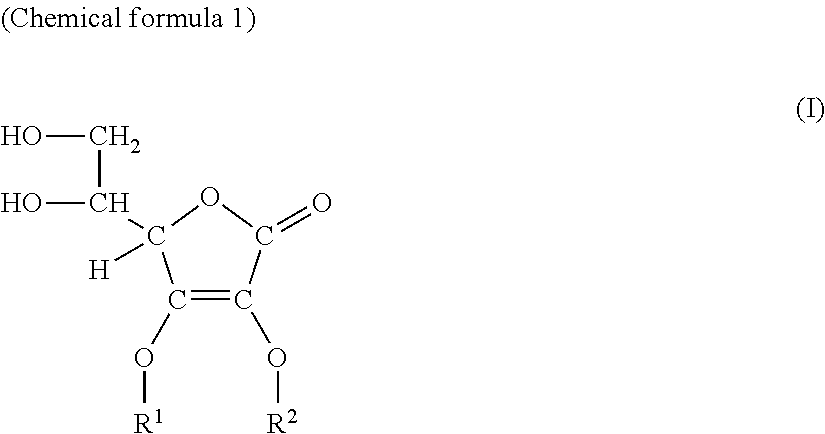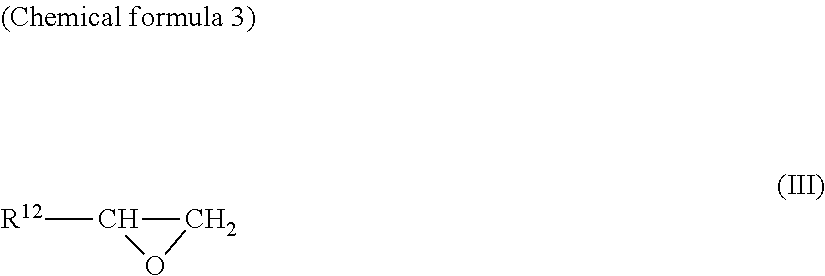Ascorbic acid derivative or salt thereof, production method thereof, and cosmetic
a technology of ascorbic acid and derivatives, applied in the field of ascorbic acid derivatives or salts, can solve the problems of complex production, insufficient stability over time of ascorbic acid derivatives, and high cost of them, and achieves the effects of good stability, good stability, and good stability
- Summary
- Abstract
- Description
- Claims
- Application Information
AI Technical Summary
Benefits of technology
Problems solved by technology
Method used
Image
Examples
example 1
Synthesis of 3-O-glyceryl ascorbic acid
[0098]Under an argon atmosphere, L-ascorbic acid (300 g) and sodium hydrogen carbonate (42.9 g) were added to water and the resultant mixture was stirred at room temperature for 30 minutes, then, glycidol (126 g) was added thereto. Thereafter, the mixture was heated up to 50° C. and stirred for 5 hours. Thereto, methanol was added and filtration was performed. The filtrate was concentrated under reduced pressure, and 457 g of the resultant residue was subjected to silica gel column chromatography. Elution was performed with chloroform / methanol / water(volume ratio:65 / 35 / 5), and concentration was performed under reduced pressure to obtain 3-O-glyceryl ascorbic acid (296 g).
[0099]On the resultant product, high resolution mass analysis, infrared absorption spectrum, 1H-NMR and 13C-NMR measurements were carried out, and based on the measurement results, this product was confirmed to be 3-O-glyceryl ascorbic acid of the following structural formula.
[0...
example 2
Synthesis of Sodium 3-O-glyceryl ascorbate
[0103]One gram of 3-O-glyceryl ascorbic acid obtained according to the same manner as in Example 1 was dissolved in water, and 336 mg of sodium hydrogen carbonate was added thereto. The mixture was stirred for 30 minutes, then, concentrated under reduced pressure to obtain 1.07 g of sodium 3-O-glyceryl ascorbate.
[0104]
example 3
Synthesis of 2-O-glyceryl ascorbic acid
[0105]Under an argon atmosphere, L-ascorbic acid (10.0 g) and sodium hydrogen carbonate (9.54 g) were added to water and the resultant mixture was stirred at room temperature for 30 minutes, then, glycidol (8.41 g) was added thereto. Thereafter, the mixture was heated up to 60° C. and stirred for 5 hours. Thereto, methanol was added and filtration was performed. The filtrate was concentrated under reduced pressure, and 19.0 g of the resultant residue was subjected to silica gel column chromatography. Elution was performed with chloroform / methanol / water(volume ratio:6 / 4 / 1), and concentration was performed under reduced pressure to obtain 2-O-glyceryl ascorbic acid (1.21 g).
[0106]
PUM
| Property | Measurement | Unit |
|---|---|---|
| temperature | aaaaa | aaaaa |
| temperature | aaaaa | aaaaa |
| pH | aaaaa | aaaaa |
Abstract
Description
Claims
Application Information
 Login to View More
Login to View More - R&D
- Intellectual Property
- Life Sciences
- Materials
- Tech Scout
- Unparalleled Data Quality
- Higher Quality Content
- 60% Fewer Hallucinations
Browse by: Latest US Patents, China's latest patents, Technical Efficacy Thesaurus, Application Domain, Technology Topic, Popular Technical Reports.
© 2025 PatSnap. All rights reserved.Legal|Privacy policy|Modern Slavery Act Transparency Statement|Sitemap|About US| Contact US: help@patsnap.com



